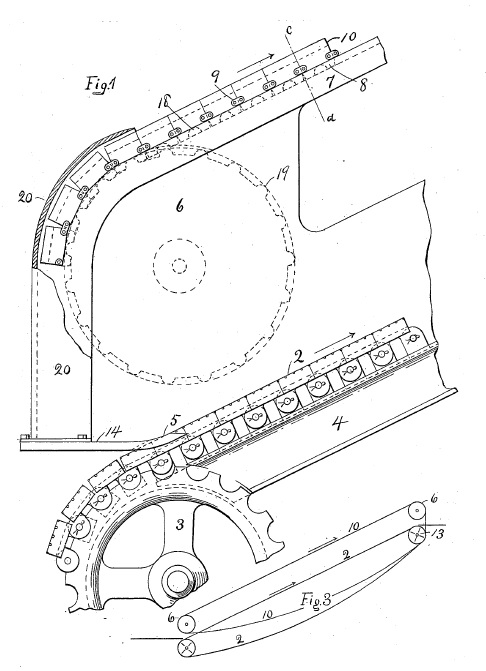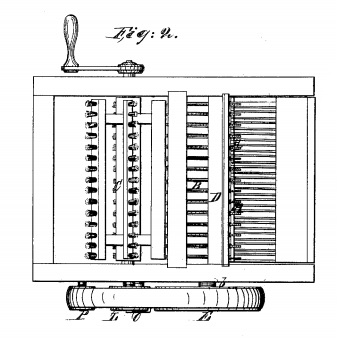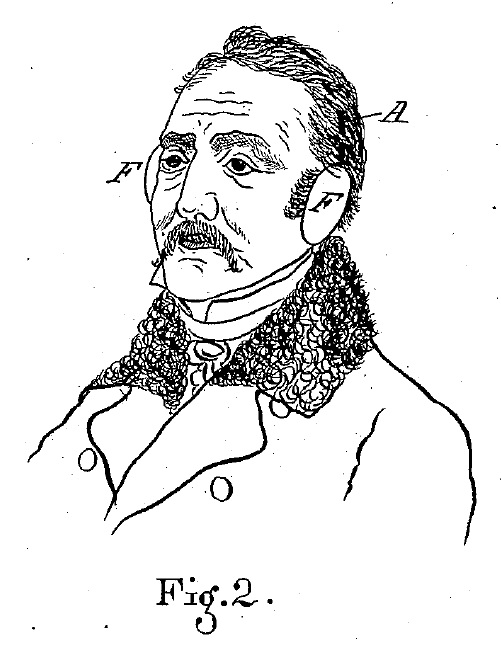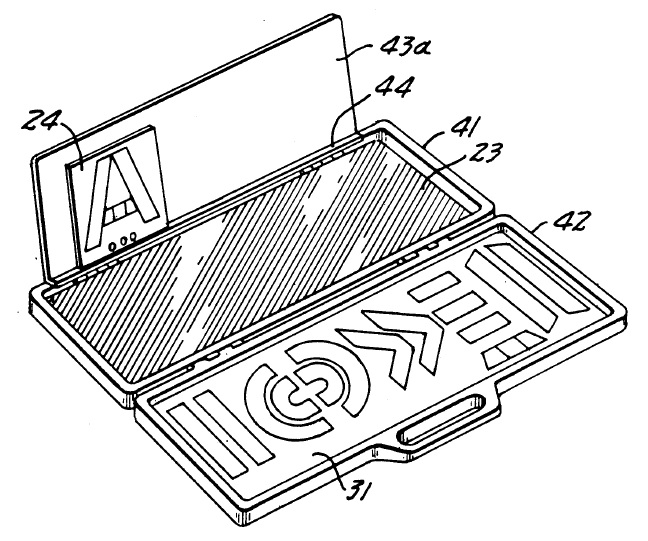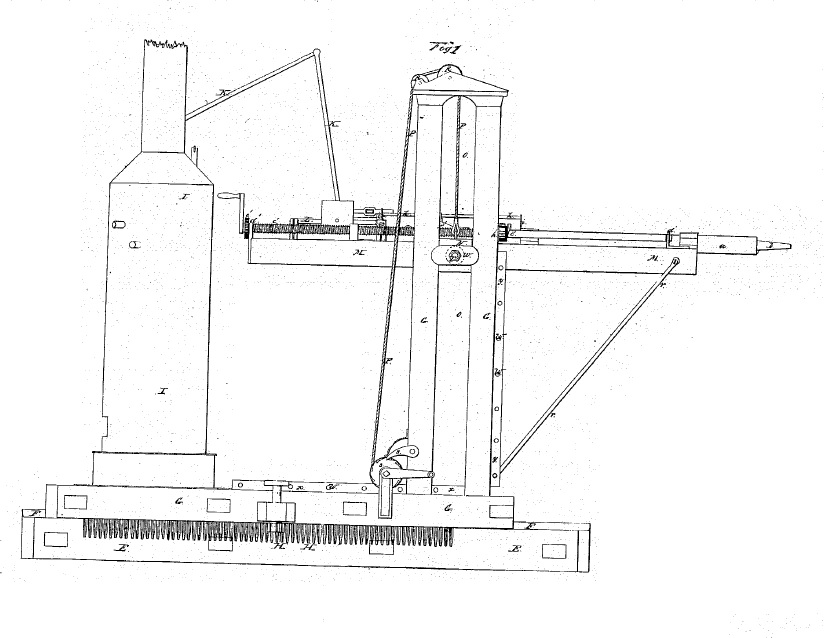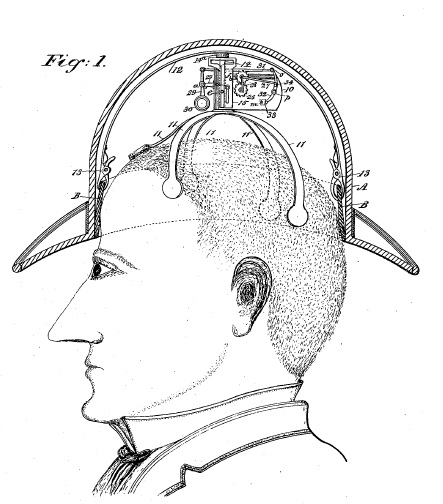On March 15, 1982, U.S. Patent No. 470,918 issued to Jesse W. Reno, on an Endless Conveyor or Elevator, which was used as an amusement at Coney Island.
Monthly Archives: March 2016
PTAB Can’t Rely on Anticipation Argument first Made during the Oral Hearing
In Dell Inc, v, Acceleron, LLC, [2015-1513, -1514](March 15, 2016) the Federal Circuit affirmed the confirmation of claims, but remanded the cancellation of two claims for reconsideration in view of corrected claim construction. At issue was the claim language “a microcontroller module and a dedicated ethernet path, wherein the dedicated ethernet path is separate from a switched fast ethernet connection and provides the microcontroller module with a connection to remotely poll the CPU module, the power module and the ethernet switch module.” The Board concluded, that it is enough that there be an ethernet path that would provide a connection for polling if the microcontroller were configured for, and engaged in, remote polling of the three identified modules. The Federal Circuit held that this construction runs counter to the claimconstruction principle that meaning should be given to all of a claim’s terms, denying any substantial meaning to “remotely poll.”
Also at issue was the anticipation of the claim limitation “caddies” which the Federal Circuit found was first identified in the reference during the oral argument before the Board. The Federal Circuit vacated the finding of anticipation because the Board denied the patent owner notice and a fair opportunity to respond to this basis of cancellation. The Federal Circuit explained that a patent owner is undoubtedly entitled to notice of and a fair opportunity to meet the grounds of rejection. The Federal Circuit said that for a formal adjudication like the inter partes, the APA imposes particular requirements on the PTO. The agency must timely inform the patent owner of the matters of fact and law asserted (5 U.S.C. § 554(b)(3)), must provide all interested parties opportunity for the submission and consideration of facts and arguments and hearing and decision on notice, (5 U.S.C. § 554(c)), and must allow a party to submit rebuttal evidence as may be required for a full and true disclosure of the facts, (5 U.S.C. § 556(d)). The Federal Circuit noted that the PTO has advised participants in its Board proceedings that, at oral argument, a party may only present arguments relied upon in the papers previously submitted, and that no new evidence or arguments may be presented at the oral argument. However, the Federal Circuit found that the Board denied the patent owner its procedural rights by relying in its decision on a factual assertion introduced into the proceeding only at oral argument, after the patent owner could meaningfully respond.
While a Nice Place, Canada is not the Best Place to Litigate U.S. IP
In Halo Creative & Design Limited v. Comptoir des Indes Inc., [2015-1375] (March 14, 2016), the Federal Circuit reversed the Northern District of Illinois’ dismissal of Halo’s complaint for copyright, trademark and U.S. design patent infringement for forum non conveniens grounds because the Federal Court of Canada would be a superior forum.
Forum non conveniens, allows a court to dismiss a suit over which it would normally have jurisdiction if trial in a foreign forum would best serve the convenience of the parties and the ends of justice. Whether dismissal would promote convenience and justice should be determined by weighing private and public interest factors. Private interest factors include the relative ease of access to sources of proof; availability of compulsory process for attendance of unwilling, and the cost of obtaining the attendance of unwilling, witnesses. Public interest factors include congestion of the courts; the burden of jury duty imposed upon a community which has no relation to the litigation; a local interest in having localized controversies decided at home; and the potential for a conflict of laws. The Federal Circuit found that Comptoir des Indes failed to meet its burden to show that Canada is a more appropriate forum for Halo’s claims of infringement of copyrights, trademarks, and patents in the United States.
March 14 Patent of the Day
March 13 Patent of the Day
March 12 Patent of the Day
March 11 Patent of the Day
Look at the Context, Sometimes “A” means “A”
In In re Varma, [2015-1502, -1667] (March 10, 2016) the Federal Circuit reversed the PTAB’s cancellation of claims of U.S. Patent No. 6,349,291 in two inter partes reexamination proceedings. in one of the proceedings, the construction of ““a statistical analysis request corresponding to two or more selected investments” was at issue. The Board held that this phrases embraces a request that calls for a statistical analysis of a single investment. The Federal Circuit noted that the Board relied on the claims’ use of “comprising” as the transitional term, but found that this did not support the Board’s construction. The Federal Circuit said that although the transitional term “comprising” indicates that the claim is open-ended, the term does not render each limitation or phrase within the claim open-ended. The Federal Circuit explained:
“Comprising” means that the claim can be met by a system that contains features over and above those specifically required by the claim element, but only if the system still satisfies the specific claim-element requirements: the claim does not cover systems whose unclaimed features make the claim elements no longer satisfied.
The Federal Circuit also noted that the Board cited the indefinite article “a” before “statistical analysis request” to support its interpretation. However the Federal Circuit said that while “a” sometimes is non-restrictive as to number, permitting the presence of more than one of the objects following that indefinite article, context matters even as to whether the word has that meaning. The Federal Circuit said the question is not whether there can be more than one request in a claim-covered system: there can. Rather, the question was whether “a” can serve to negate what is required by the language following “a”: a “request” (a singular term) that “correspond[s]” to “two or more selected investments.” The Federal Circuti said that it cannot. The Federal Circuit observed “For a dog owner to have ‘a dog that rolls over and fetches sticks,’ it does not suffice that he have two dogs, each able to perform just one of the tasks.
The Federal Circuit held that the Board applied an unreasonably broad interpretation, and remanded the applications to be reconsidered in light of the proper claim construction.
Know When to Fold ‘Em — Games are Unpatentable Abstract Ideas
In In re Smith, [2015-1664] (March 10, 2016) the Federal Circuit affirmed the rejection of claims in Smiths’ application for claiming patent-ineligible subject matter under 35 U.S.C. § 101, because the claims cover only the abstract idea of rules for playing a wagering game and use conventional steps of shuffling and dealing a standard deck of cards.
The Federal Circuit applied the now-familiar two-step test introduced in Mayo, and further explained in Alice, first determining whether the claims at issue are directed to a patent-ineligible concept such as an abstract idea, and second examining the elements of the claim to determine whether it contains an inventive concept sufficient to transform the claimed abstract idea into a patent-eligible application. On the first step, the Federal Circuit concluded that the claims, directed to rules for conducting a wagering game, compare to other fundamental economic practices found abstract by the Supreme Court. The Federal Circuit agreed with the Board that a wagering game is, effectively, a method of exchanging and resolving financial obligations based on probabilities created during the distribution of the cards, and the Supreme Court has held that a method of exchanging financial obligations was drawn to an abstract idea. The Federal Circuit also noted its own cases have denied patentability of similar concepts as being directed towards ineligible subject matter.
As to the second step, the Federal Circuit noted that abstract ideas, including a set of rules for a game, may be patent eligible if they contain an “‘inventive concept’ sufficient to transform the claimed abstract idea into a patent-eligible application. However, appending purely conventional steps to an abstract idea does not supply a sufficiently inventive concept. The Federal Circuit rejected that shuffling and dealing physical playing cards were not sufficient to bring the claims within patent eligible territory.

